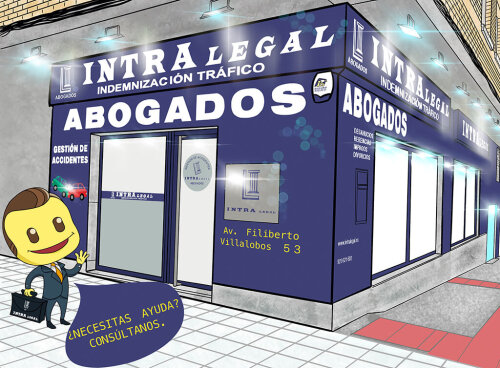Best Brokerage Lawyers in Salamanca
Share your needs with us, get contacted by law firms.
Free. Takes 2 min.
Free Guide to Hiring a Real Estate Lawyer
List of the best lawyers in Salamanca, Spain
About Brokerage Law in Salamanca, Spain
Brokerage plays a significant role in various sectors of Salamanca, including real estate, commercial transactions, and financial services. In the context of Spanish law, a broker, or “agente intermediario,” serves as an intermediary connecting parties interested in completing a specific transaction. Brokerage laws in Salamanca are mainly derived from national Spanish regulations, especially the Civil Code, as well as specific local regulations and industry practices. The goal of these regulations is to provide clarity on the broker's role, define their rights and obligations, protect consumer interests, and regulate the payment of fees or commissions. Contracts, transparency, and adherence to guidelines are essential features of the brokerage landscape in Salamanca.
Why You May Need a Lawyer
Legal support is often necessary when navigating brokerage transactions in Salamanca. Common situations where you may benefit from a lawyer's assistance include:
- Drafting or reviewing brokerage agreements to ensure legal compliance and protection of your interests.
- Disputes over brokerage commissions or fees, especially if there is ambiguity regarding payment terms.
- Misrepresentation, fraud, or non-disclosure by a broker affecting your transaction.
- Real estate purchases or sales, where brokers are often involved and legal oversight can prevent costly mistakes.
- Regulatory compliance issues if you are working as a broker or planning to open a brokerage business.
- Conflicts over exclusivity agreements or breach of contract scenarios.
- Assisting with complaints to local authorities or professional organizations regarding broker malpractice.
- Navigating the legal obligations for foreign clients or international brokerage activities in Salamanca.
Local Laws Overview
Brokerage law in Salamanca primarily adheres to Spain's national legal framework, particularly the Civil Code, which defines the mediation contract (contrato de mediación or corretaje). Key legal aspects relevant to brokerage include:
- Brokers must act in good faith and are required to disclose all material information relevant to a transaction.
- Brokerage contracts do not always need to be in writing but must clearly establish the nature of the service, commission rates, and conditions for payment.
- In real estate, brokers are not typically agents with power to sign but rather intermediaries who facilitate contact and negotiation.
- Payment of commission to a broker is generally contingent on the successful completion of the transaction unless otherwise stipulated.
- Professionals acting as brokers may also need to comply with licensing requirements and local commercial regulations.
- Misconduct or violations can be reported to organizations such as the Official College of Real Estate Agents of Salamanca or consumer protection bodies.
Frequently Asked Questions
What is a broker in the context of Spanish law?
A broker acts as an intermediary who brings together parties interested in completing a transaction, such as buying, selling, or leasing property or goods, and typically obtains a commission for their services.
Is it necessary to have a written contract with a broker?
While not always legally required, having a written contract is strongly recommended to establish the rights, duties, and commission structure agreed upon between the parties and the broker.
When is a broker entitled to receive a commission?
A broker is usually entitled to a commission only when the transaction is successfully completed, unless the contract specifies otherwise.
Are there licensing or registration requirements for brokers in Salamanca?
Yes, especially in real estate and financial sectors. Brokers may need to register with the relevant professional association or meet local business requirements to legally operate.
What can I do if a broker fails to disclose important information?
You can seek legal remedies under Spanish law, including potential claims for damages, contract rescission, or reporting the broker to regulatory authorities or industry bodies.
How are disputes between clients and brokers resolved?
Disputes can typically be resolved through negotiation, mediation, or through legal action in Spanish courts if necessary. Some professional associations also offer arbitration services.
Is the broker allowed to act for both parties in a transaction?
Spanish law permits dual agency in certain transactions, but full disclosure and consent of both parties are required to prevent conflicts of interest.
What if I am unhappy with the broker’s services?
If you believe a broker has acted improperly, you can file a complaint with consumer protection bodies, relevant professional associations, or seek compensation through legal action.
How are brokerage commissions regulated?
While there is flexibility, commissions must be clearly established in the contract and comply with consumer protection regulations. Standard rates may apply in some sectors, but negotiation is common.
Are brokerage services subject to tax in Salamanca?
Yes, commissions earned by brokers are subject to value added tax (IVA) and must be properly invoiced and declared to the Spanish tax authorities.
Additional Resources
If you need more information or assistance, the following organizations and resources can be helpful:
- College of Real Estate Agents of Salamanca (Colegio Oficial de Agentes de la Propiedad Inmobiliaria de Salamanca) - offers professional standards and complaint resolution mechanisms.
- Salamanca Bar Association (Ilustre Colegio de Abogados de Salamanca) - can provide guidance on legal representation and lawyers specializing in brokerage matters.
- Municipal Consumer Office (Oficina Municipal de Información al Consumidor, OMIC) - provides consumer advice and assists with complaints involving brokers.
- Spanish Civil Code - contains the primary legal provisions on brokerage contracts and obligations.
- Local business registries and chambers of commerce - resources for verifying a broker’s credentials and business standing.
Next Steps
If you require legal assistance regarding brokerage in Salamanca, consider the following steps:
- Gather all documentation related to your brokerage transaction, including contracts, communications, and invoices.
- Consult with a specialist lawyer familiar with brokerage law in Salamanca to review your case and advise you on your rights and options.
- Contact relevant regulatory bodies or professional associations if you suspect malpractice or need to verify the credentials of a broker.
- Act promptly, especially if there are financial or contractual deadlines involved in your transaction.
- If uncertain, seek an initial consultation with a qualified legal professional to clarify your position and the best path forward.
Having expert legal advice can help you avoid costly mistakes, resolve disputes efficiently, and ensure your interests are protected in any brokerage transaction in Salamanca.
Lawzana helps you find the best lawyers and law firms in Salamanca through a curated and pre-screened list of qualified legal professionals. Our platform offers rankings and detailed profiles of attorneys and law firms, allowing you to compare based on practice areas, including Brokerage, experience, and client feedback.
Each profile includes a description of the firm's areas of practice, client reviews, team members and partners, year of establishment, spoken languages, office locations, contact information, social media presence, and any published articles or resources. Most firms on our platform speak English and are experienced in both local and international legal matters.
Get a quote from top-rated law firms in Salamanca, Spain — quickly, securely, and without unnecessary hassle.
Disclaimer:
The information provided on this page is for general informational purposes only and does not constitute legal advice. While we strive to ensure the accuracy and relevance of the content, legal information may change over time, and interpretations of the law can vary. You should always consult with a qualified legal professional for advice specific to your situation.
We disclaim all liability for actions taken or not taken based on the content of this page. If you believe any information is incorrect or outdated, please contact us, and we will review and update it where appropriate.










